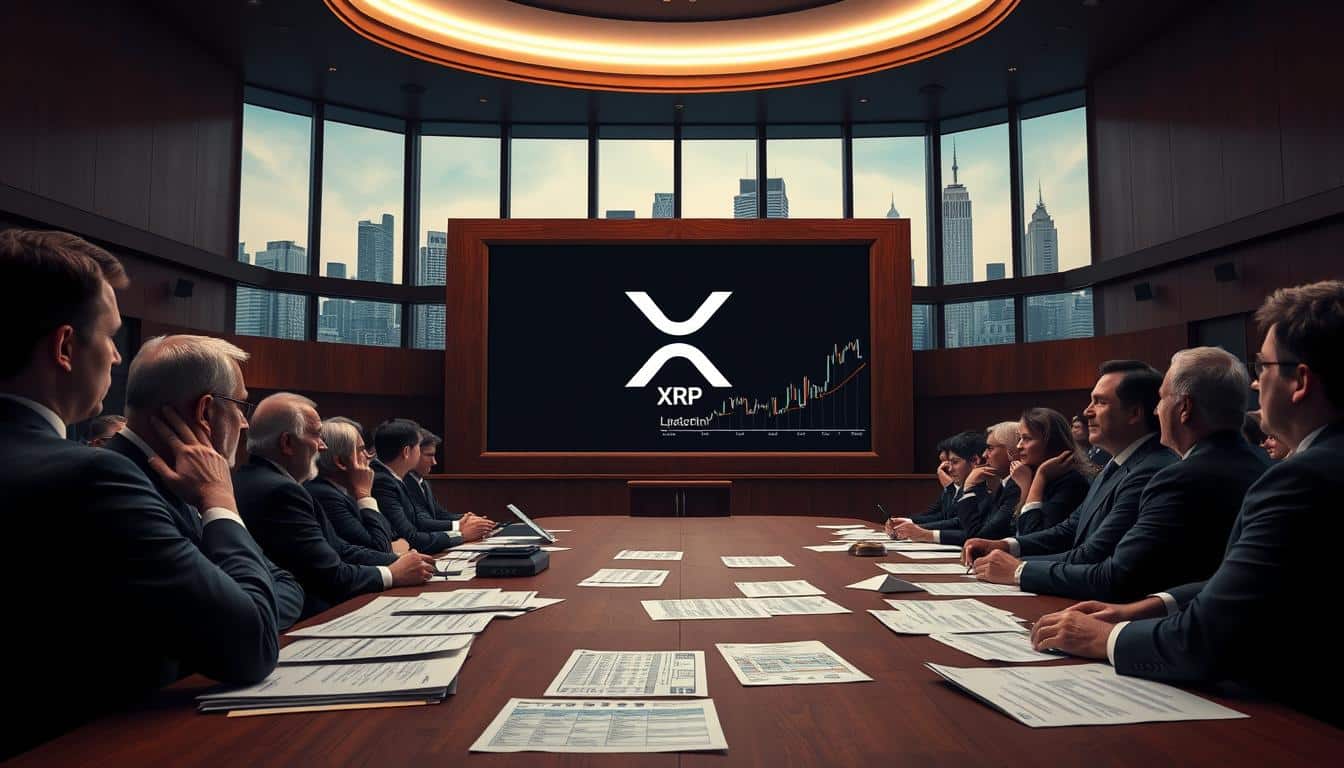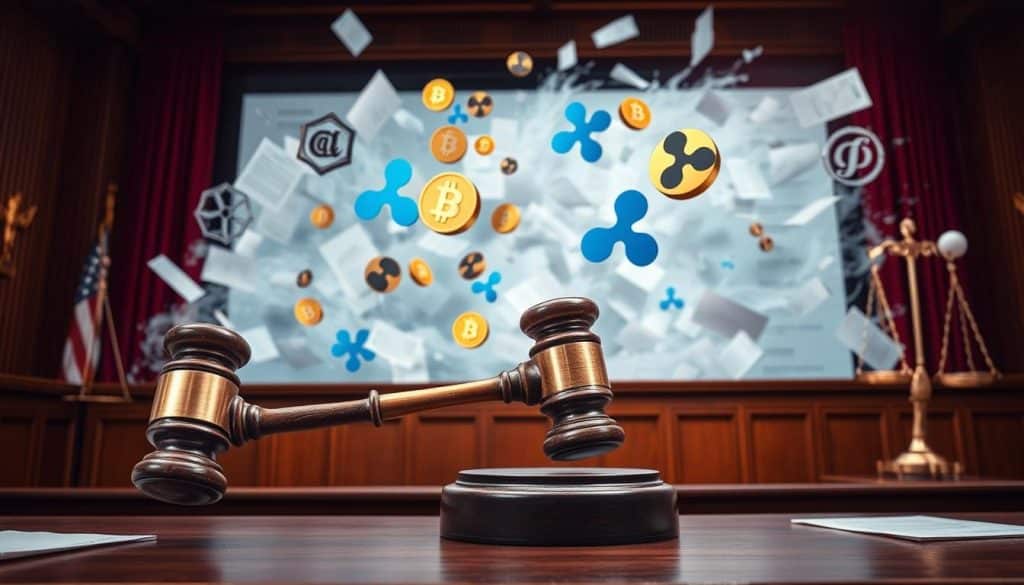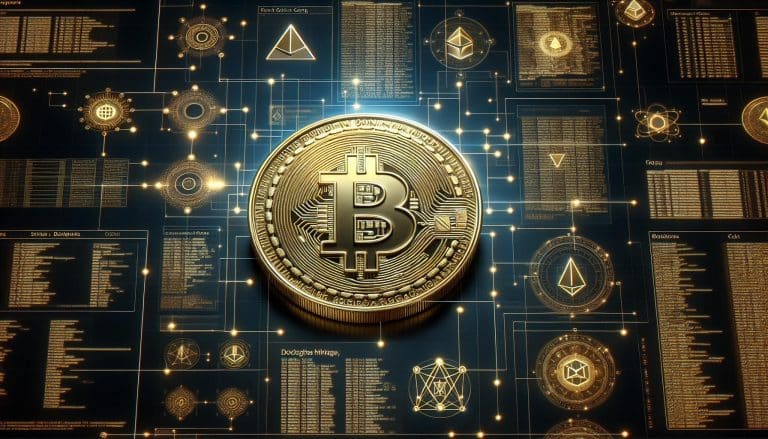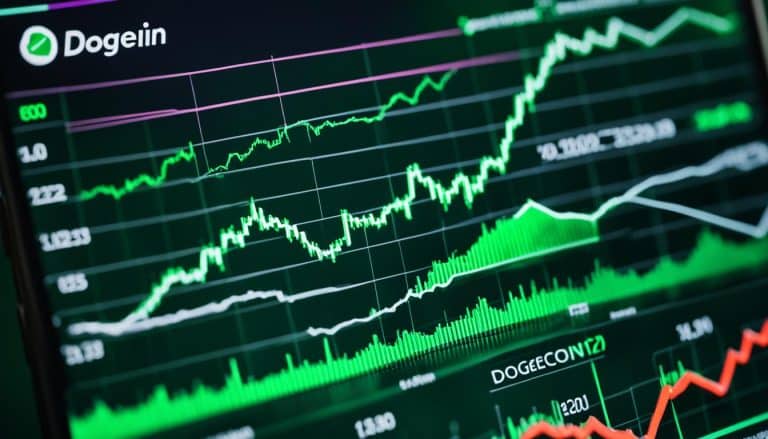Stay Informed: Latest XRP Case Update Unveiled
Ripple’s XRP recently soared by about 30% in late March 2023, fired up by hopes of ending its long legal fight with the SEC1. After a small win allowed Ripple to make the SEC reveal the “Hinman documents,” CEO Brad Garlinghouse shared his hopeful outlook for solving the case this year1. Now, Ripple has asked to pause the financial penalty initially set at $125 million by the SEC2. Instead, they suggest holding 111% of this sum in trust as they await a potential SEC challenge2.
Key Takeaways
- XRP’s price surged around 30% in late March due to case closure reports1.
- Ripple CEO Brad Garlinghouse is optimistic about a resolution in 20231.
- Ripple requested a stay on the $125 million monetary judgment2.
- The proposed arrangement includes keeping 111% of the amount in trust2.
- Potential for an SEC appeal is increasing, making XRP’s future uncertain2.
Overview of the Ripple Lawsuit Against the SEC
The legal battle between Ripple Labs and the SEC started in December 2020, catching the eye of many in the crypto world. The SEC argued Ripple raised above $1.3 billion via unregistered XRP sales3. They said this was an unlicensed securities sale according to the Securities Act of 1933. Ripple insists XRP is not a security, leading to widespread debate and calls for clear crypto regulations.
Background of the Case
The dispute between Ripple and the SEC is crucial for the crypto industry. Ripple faced accusations of selling securities without registration since 2013. Although in October 2023, charges against Ripple leaders Brad Garlinghouse and Chris Larsen were dropped3. Still, the SEC wanted other actions related to these unregistered sales3, believing XRP went against Section 5 of the Securities Act4.
Key Parties Involved
The case involves major names like the SEC, Ripple CEO Brad Garlinghouse, and co-founder Chris Larsen. Initially, the SEC targeted these executives with charges that were later dropped3. Garlinghouse sees this as a win for Ripple and the wider crypto market4.
Initial Allegations and Charges
The SEC accused Ripple of selling XRP without proper registration. The court decided XRP was a security for institutional sales, but not on public exchanges3. Ripple was hit with a $125 million fine, much less than the $2 billion the SEC first wanted4. Despite these rulings, Ripple’s legal battles are still influencing digital asset lawsuits and crypto regulations.
Recent Developments in the XRP Case Update
The Ripple case has recently impacted the market significantly. XRP’s value jumped by about 40% in the last week. It now trades at $0.58, hitting a weekly high of $0.6365. This growth shows traders and investors are feeling hopeful about the lawsuit’s outcome.
A key moment was when U.S. District Judge Analisa Torres ruled on the case6. She decided that XRP isn’t a security when sold to regular buyers. But, it is seen as one when sold to big investors. This decision has brought some clarity to the crypto world.
Ripple Labs donated $1 million to support a political campaign6. This shows they’re getting involved in politics. Ripple’s CEO, Brad Garlinghouse, believes the case might be resolved by mid-2023.
These changes have made XRP the sixth biggest cryptocurrency. It has a market value of about $34 billion6. Bitcoin remains the largest, worth about $1.3 trillion. These events are key for anyone following the Ripple case and the crypto market.
But, Ripple still faces legal issues. The SEC wants a $2 billion fine and to stop sales to big investors7. Even with recent gains, XRP’s stability is watched closely. After a small drop, it fell to $0.4808, its lowest since April 137.
Yet, trading volume has increased by 6% over the last day5. This shows that interest in the market remains strong. The future of Ripple and how it will affect the crypto market in the U.S. is still to be decided.
Ripple’s Request for a Stay on Monetary Judgment
Ripple has requested a stay on the SEC’s monetary judgment. This move aims to give Ripple some breathing room. It prepares both sides for a long legal fight.
Details of the Stay Request
On August 7, Ripple was fined $125 million by the SEC for breaking securities laws. They asked to delay the fine payment and offered to deposit 111% of it, or about $139 million8, into a secure account. Judge Analisa Torres agreed to this, letting Ripple wait to pay the fine until the SEC decides on an appeal9.
The stay lasts until 30 days after the 60-day appeal period from the final judgment in August10. Ripple sees this as a key part of their legal strategy in the ongoing court case.
SEC’s Response and Agreement
The SEC is considering whether to appeal. They have until October 6 to make this decision9. Legal expert Fred Rispoli thinks there’s a 60% chance the SEC will appeal after Ripple’s stay request9. Both Ripple and the SEC know the stakes are high in this case.
XRP’s price could be impacted by the SEC’s final decision to appeal or not10.
Here’s a quick summary:
| Event | Date | Details |
|---|---|---|
| Ripple fined $125 million | August 7, 2024 | Violation of securities laws by SEC9 |
| Stuart Alderoty’s Donation | August 2024 | Donated $300,000 to Trump’s Campaign9 |
| XRP Price | September 4, 2024 | Closed at $0.558710 |
These court cases will greatly affect Ripple’s legal moves and the wider crypto market xrp court developments.
Implications of a Potential Appeal by the SEC
The SEC is thinking about appealing in the Ripple case. This action could majorly affect the entire cryptocurrency world. Legal experts are looking into what this appeal might mean. They consider how it affects the crypto market as a whole.
Opinions from Legal Experts
Legal thinkers believe the SEC’s appeal decision depends on various factors. A critical factor is Judge Analisa Torres’s decision. It required Ripple to pay a $125 million penalty but rejected a bigger $876 million claim11. The timing of any appeal is crucial, too. Experts say a higher court’s decision might not come until 2025. A Supreme Court decision could take even longer, maybe not until 2026 or after12. This shows how crypto regulation is constantly changing and complex.
Impact on XRP and the Cryptocurrency Market
The ripple case affects XRP and the whole cryptocurrency market greatly. Even with an SEC appeal possible, XRP stays strong. After the judge’s decision, XRP’s value went up by more than 20%12. Analysts believe the appeal might not hurt XRP much. Ripple’s market value is $35 billion, showing investors are still confident12.
Also, Ripple’s success in raising funds through an IPO shows it can keep its market position stable. This suggests the market might remain steady, despite legal challenges.
Key Dates and Deadlines to Watch
The xrp lawsuit is changing rapidly, and there are key dates you should watch out for. Among these, the 60-day appeal window following the August 7 court ruling is vital. This period will see crucial appeals and documents being submitted. The SEC has asked for nine more days to submit its brief on remedies, moving its deadline to March 22, 202413. Ripple also got more time to respond to the SEC’s brief, now having until April 22, 202413.
Attorney Jeremy Hogan thinks a settlement could hit around $100 million. Meanwhile, Ripple’s top legal officer suggests a $10 million max penalty could be possible14. The SEC has until April 29 to reply to Ripple’s motions, as set by Magistrate Judge Sarah Netburn14. Judge Netburn also extended the SEC’s reply deadline to April 29, 2024, showing how serious these xrp court matters are14.
Experts in law believe the final decision will likely come by summer 202413. Until then, Ripple plans to carefully manage its defense, aware that legal costs have already topped $150 million13. The movement of 180 million xrp coins by big holders has sparked talk about the lawsuit’s end result14.
| Date | Event |
|---|---|
| March 22, 2024 | SEC’s remedies-related opening brief deadline |
| April 22, 2024 | Ripple’s opposition to the SEC’s remedies-related brief deadline |
| April 29, 2024 | SEC’s reply extension deadline granted by Judge Netburn |
These dates are crucial in the xrp lawsuit. Each one is very important in deciding the case’s final outcome. Stay updated to keep up with the latest news and happenings in the xrp lawsuit.
Reactions from Ripple’s Leadership
Ripple’s leadership has responded strongly to the XRP lawsuit’s ruling. Ripple CEO Brad Garlinghouse and Chief Legal Officer Stuart Alderoty have shared their positive outlook on the case. They have also highlighted the need for clear rules in the crypto world.
Statements from CEO Brad Garlinghouse
Brad Garlinghouse has been vocal about Ripple’s position during the legal fight. He said the SEC’s harsh actions were not needed. After a judge’s decision that Ripple must pay $125 million for breaking federal securities laws by selling XRP to big clients, Garlinghouse noted that the fine was much less than the SEC’s initial demand of nearly $2 billion15. He emphasized the need for clear regulatory guidance and warned that the SEC’s way might slow down innovation16.
Insights from Ripple’s Chief Legal Officer
Stuart Alderoty viewed the judgment as a big win for Ripple. He mentioned that the fines were manageable for Ripple and no direct harm was found on big investors16. Alderoty is sure about the judgment’s finality but recommends being careful of a possible SEC appeal16. His view shows Ripple’s effort to stay compliant and innovative amid changing regulations.
Ripple’s leaders are united and hopeful about the lawsuit’s impact. They believe the outcome will be good for Ripple and help push for better crypto regulations. For more details and updates on this case, visit this link.
Market Reactions: XRP Price Movements
In the fast-moving world of cryptocurrencies, XRP has seen lots of ups and downs. These changes are largely due to the Ripple lawsuit news. Investors are keeping an eye on how this lawsuit might affect XRP’s value, both now and in the future.
Current XRP Price Analysis
Right now, Ripple’s XRP is at $0.53 after a 24% drop from its March peak17. The stash of XRP on exchanges has gone down 28% since February, equaling 2.58 million tokens or $1.32 million17. Despite the dip, Ripple’s CEO, Brad Garlinghouse, believes the SEC doesn’t have a strong case to prove XRP is a security18.
On September 3, XRP’s value went down 1.94% to $0.5571, while the whole crypto market saw a 2.98% fall18. This decrease partly took back a 3.17% rise from the day before18. The 14-day RSI at 45.93 hints that XRP’s value might fall more before it’s considered too low18.
Currently, XRP’s price is under the 50-day EMA but over the 200-day EMA. This shows mixed signals: short-term caution but long-term optimism18. Breaking the 50-day EMA could push XRP towards $0.5739 and maybe even $0.6018.
Future Price Predictions
What happens next with XRP depends on the SEC’s next move in the Ripple case. If the SEC appeals, XRP could fall below $0.4018. If not, it might rise towards $1.0018, showing how legal actions can sway crypto prices.
Since July 17, XRP has been moving sideways. It could hit $0.56 or $0.60 on a good retest, but might drop to $0.46 if it fails17. A positive retest could mean more gains ahead if demand stays strong17.
Keeping up with XRP price trends and the wider crypto market can help you make smart choices as the legal drama continues. This drama directly affects how investors feel and the price changes of cryptocurrencies.
Legal Context: Other Cryptocurrency Lawsuits
The Ripple lawsuit isn’t the only one happening. It’s important to see this as part of a larger picture in the crypto world. Many lawsuits have popped up, defining how the law views digital assets.
On December 22, 2020, the SEC took action against Ripple Labs, accusing it of selling XRP, its cryptocurrency, unlawfully19. It claimed Ripple and its leaders made over $1.3 billion illegally through digital asset sales20. These cases are at the heart of a big debate on whether digital assets are securities or not.
Other big cases involve the SEC going after Telegram and Kik for their ICOs. The SEC’s case against Telegram ended with the company paying back its investors and stopping its token project. These lawsuits are making history, affecting Ripple’s defense and plans.
Bitcoin and Ethereum are not seen as securities because they are decentralized19. This makes the legal battles in crypto even more complex. Ripple says XRP is not an investment contract, so it shouldn’t be seen as a security, much like in other cases19.
The future of the crypto world hangs on these lawsuits. With XRP valued at about $25 billion, its legal situation could be a model for other cryptos under the law19. The court looking into XRP’s sales might give clues for other cases20.
Knowing the full scope of these challenges helps us grasp the big issues at play. As the legal scene evolves, it will shape how the industry grows, affecting rules and confidence in digital assets.
Expert Opinions on Ripple’s Legal Strategy
Legal experts have many views on Ripple’s strategy against the SEC’s lawsuit. They look into Ripple’s arguments to see their effect on the crypto market.
- Marc Fagel, once an SEC director, suggests an appeal could question Ripple’s programmatic sales as securities21. Ripple shows they’re confident by setting aside 111% of a judgment in escrow22.
- Bill Morgan, a legal expert, believes XRP will likely stay classified as non-security21. Both he and Fagel think Ripple’s main argument, that XRP isn’t a security, will hold up well21.
- Fred Rispoli sees a 60% chance for an SEC appeal, a change from previous predictions22. This shows legal battles are unpredictable but Ripple is ready to adapt. Their plan to secure 111% of potential judgments shows a strategic defense22.
XRP holders might feel better knowing experts like Fagel and Morgan see little risk of XRP being considered a security21. This trust from experts points to a strong aspect of Ripple’s defense.
Overall, legal experts believe Ripple’s defense strategy is strong and well-planned. By locking away 111% of a possible judgment, Ripple shows they’re ready for appeals and further legal fights22. This approach by Ripple could change how cryptocurrency regulations work.
The Role of the Howey Test in the Ripple Case
The Howey Test is a big deal in the Ripple lawsuit. It decides if XRP is seen as a security. The fight over XRP’s classification shines a light on how the Howey Test works with cryptocurrencies. This is key to understanding why XRP might be considered a security.
Explanation of the Howey Test
The Howey Test came from a 1946 Supreme Court case. It helps figure out if something is an investment contract, which means it’s a security. For a deal to be seen as an investment contract, it must hit four points:
- Investment of money
- In a common enterprise
- With the expectation of profit
- To be derived from the efforts of others
Looking at XRP, the question is if it meets these points. The SEC believes Ripple’s sales show XRP should be registered as a security23.
Application to XRP
The court looked closely at XRP sales to decide if they were securities. Judge Torres found that Ripple’s sales to big investors were indeed securities24. But, she said other ways Ripple gave out XRP didn’t count as investment contracts24.
Moreover, the court saw XRP as a digital token, not automatically an investment contract by itself. It looked at the whole situation23. This shows the challenge of applying the Howey Test to digital currencies. It sheds light on the discussion about if XRP is a security.
The Hinman Documents and Their Significance
The Hinman documents ripple case has taken an exciting twist with new SEC communications involving Bill Hinman, the former SEC director, coming to light. These documents are crucial as they hint that not all cryptocurrencies, like Ether (ETH), might be classified as securities25. Ripple Labs suggests that if ETH’s decentralized nature exempts it from being a security, XRP should be treated likewise.
Central to XRP’s lawsuit evidence is an email exchange regarding Hinman’s 2018 speech, where he suggested Ether was not a security26. Ripple uses this to argue that the SEC’s application of securities laws to cryptocurrencies has been inconsistent.
The SEC’s reluctance to move against Ether this year can be traced back to the influence of the Hinman documents. These documents may shift how the U.S. Congress opts to regulate the crypto industry, possibly bringing Ether under the Commodity Futures Trading Commission (CFTC’s)26 watch. This has led various cryptocurrencies to strive for more decentralization, aiming to bypass securities classification26.
The revelations from these documents could prompt shifts towards decentralization in cryptocurrency regulation. It shows how tokens on decentralized networks might not be seen as securities, revealing a significant gap in current regulations26.
Judge Torres’ rulings add another twist by differentiating XRP’s classification based on the type of sale25. While some sales of XRP are not considered securities, others, like those to institutional investors, are. This complex distinction not only affects Ripple but also offers vital insights for other cryptos under similar examination.
Potential Outcomes of the Ripple Case
The Ripple lawsuit’s result is massively vital for the crypto world. It shows us what might happen to Ripple and the impact on the market. The case’s outcomes might vary, affecting Ripple and its circle differently.
Best-Case Scenario
If the court finds Ripple did nothing wrong with its XRP sales, it’s good news. This is especially true for sales on big exchanges, which were found okay ripple lawsuit potential outcomes27. Ripple would keep operating smoothly without legal blocks. This might make big trading platforms offer XRP again, boosting its value and appeal xrp future outlook28.
Worst-Case Scenario
On the flip side, if Ripple is found guilty of breaking the law in its XRP sales28, things could go downhill fast. Ripple could face hefty fines, hurting its money and how it works. XRP might get removed from big exchanges again, plummeting in value like in 202028. The outlook for XRP could turn negative, with its price maybe hitting lows around $0.45, as current data suggests27.
Impact of the Ripple Case on the Crypto Industry
The Ripple lawsuit’s outcome against the SEC is big for the crypto market. After winning on July 1429, Ripple’s XRP price jumped 87%, hitting a $0.88 peak. It then settled at $0.72. This rise in XRP price shows a major impact across the market.
After the Ripple verdict29, many tokens seen as securities by the SEC saw their prices go up. This has made the market mood positive, pushing up trading and transactions for different tokens. Exchanges also saw more money move in and out during this time29.
The case sparked discussions on crypto regulation, especially affecting decentralized exchanges (DEX)29. Places like wETH and stablecoins saw more action after the court’s decision. This shows more people are hopeful and see the market favorably now.
Ripple’s fight with the SEC started in December 2020. It was over claims of raising $1.3 billion through unregistered securities deals30. This highlights the tricky regulations in crypto, impacting not only Ripple but the whole market.
Legal fights have caused XRP’s price to swing a lot30. The judge’s decision to back Ripple by saying XRP is a cryptocurrency, not a security, changed the game. It greatly influenced the market’s direction.
Here is a detailed outline of how the ripple lawsuit industry impact and crypto regulatory effect have manifested:
| Key Impact Area | Details | Source |
|---|---|---|
| XRP Price Surge | 87% increase, reaching $0.88; stabilized at $0.72 | 29 |
| Token Price Increases | Price hikes for tokens previously deemed securities | 29 |
| DEX Activities | Spike in trading and transaction volumes for wETH and stablecoins | 29 |
| Regulatory Scrutiny | Ripple accused of raising $1.3 billion via unregistered securities | 30 |
| Market Volatility | Considerable price swings due to ongoing legal proceedings | 30 |
The *crypto regulatory effect* from the Ripple case will shape future market habits and rules. The crypto world will keep changing, watching this lawsuit closely.
Conclusion
As the XRP case unfolds, the lawsuit between Ripple and the SEC has captured attention in the crypto world. The SEC imposed a $125 million penalty on Ripple, much less than the $2 billion it first wanted31. This shows how differently Ripple and the SEC see the value of XRP sales31. This gap highlights the legal troubles and uncertainties around digital currencies31. Ripple’s win in getting charges on retail sales dropped marks a key achievement. It shows these sales weren’t considered securities32.
Ripple has spent more than $150 million on its legal defense, showing the high stakes of this case for it and the crypto world32. Despite the challenges, Ripple is looking forward with hope, ready to not appeal the decision even as the SEC might31. An SEC appeal could extend the uncertainty around XRP’s situation32.
The court’s ruling has boosted XRP’s market value and transactions, benefiting Ripple’s standing in the market31. This trial highlights the urgent need for clear rules on cryptocurrencies. Ripple’s journey might help shape future laws for digital currencies, showing how they fit with securities laws31.
What happens next, including any appeals, will impact Ripple’s path and help bring more clarity to crypto regulations. Keeping an eye on this case can offer views on how legal standards for cryptocurrencies may evolve. It could influence the fate of digital currencies and their owners32.





